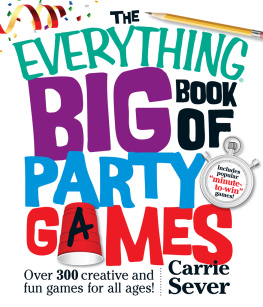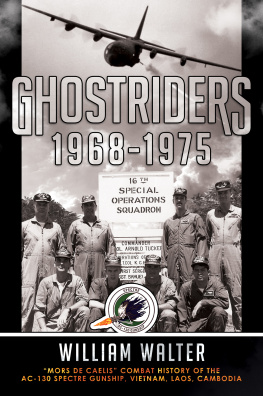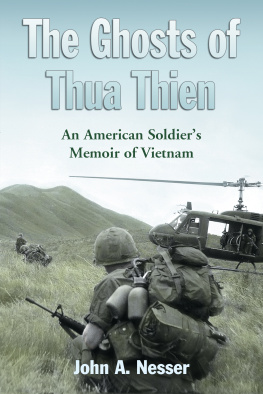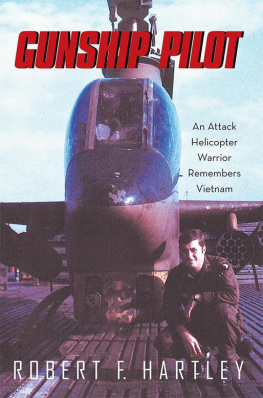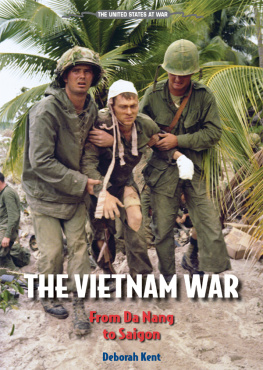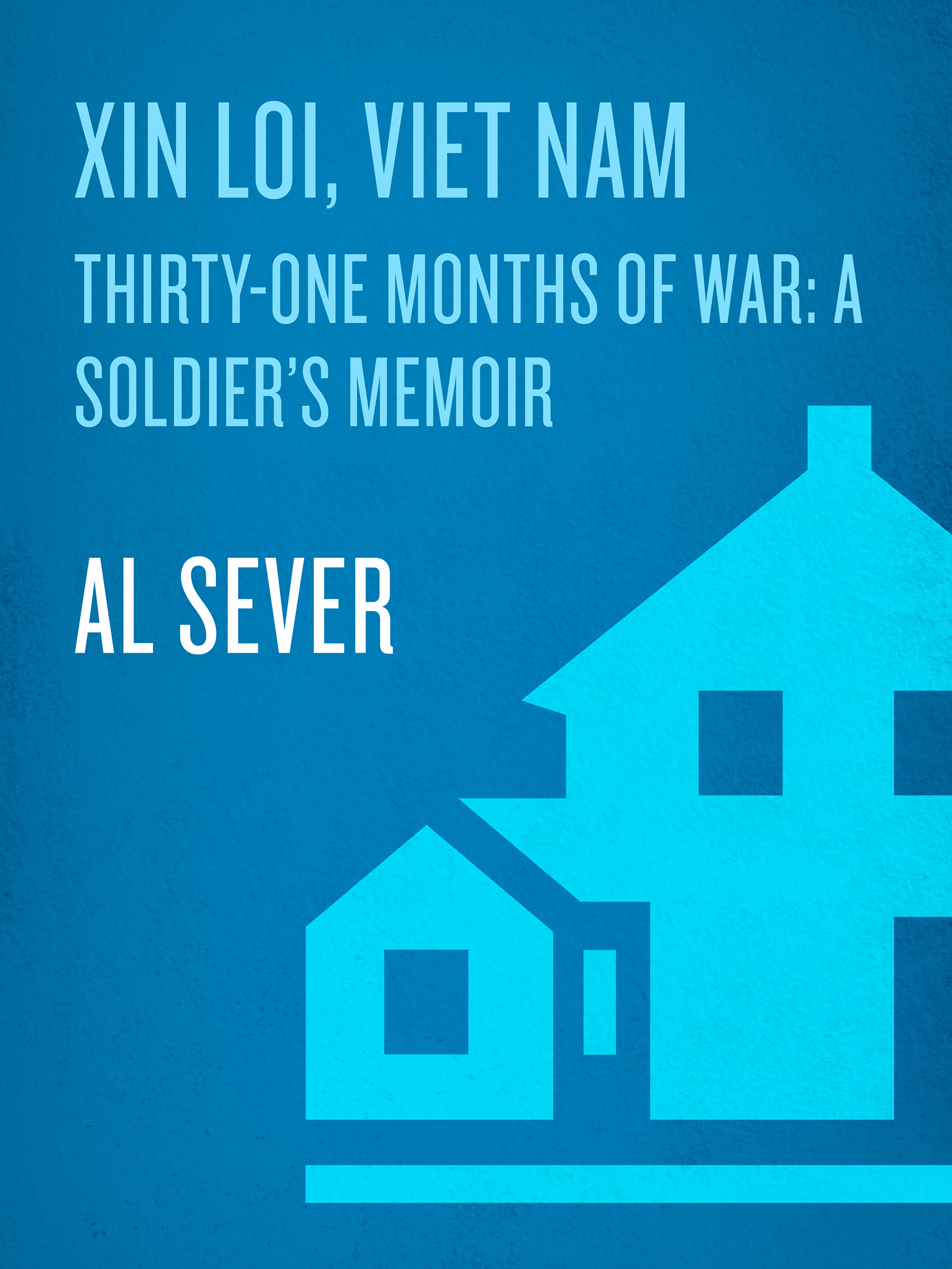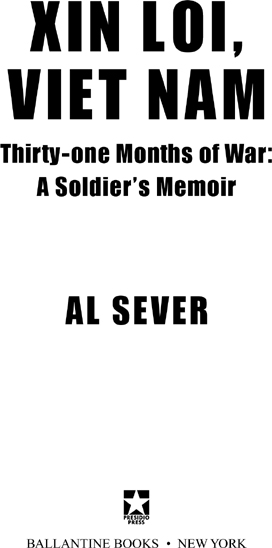Books published by The Random House Publishing Group are available at quantity discounts on bulk purchases for premium, educational, fund-raising, and special sales use. For details, please call 1-800-733-3000.
A boy I went to school with left his legs in Viet Nam. He once told me that, after most people got to know him, they would eventually ask, What was it like in Viet Nam?
What a question to ask! What was Viet Nam like? No one wants to learn about the geography or the topography when they ask that question. Their next question is always, Did you kill anyone?
How the hell should I know, he'd answer, I was only there eight days!
Eight days. I can visualize exactly what he looked like then. Another FNG who didn't know anything. Everyone too busy or tired to show him anything. I imagine he looked like the young man portrayed as one of three infantrymen in the sculpture at the Vietnam Veterans Memorial. Most people who look at the sculpture don't realize what they are seeing. There is more there than three tired young men. When I first saw the statue, I just shook my head. I wondered why the artist had made such a glaring erroruntil I realized he had shown the truth. In the small group, the error of carrying a belt of ammunition with the cartridge bullet tips pointing toward his neck makes one man immediately recognizable as the typical expendable replacement, the new guy no one knows. And no one cares if he lives or dies. When I stood in front of the statue, like a lot of old soldiers, I felt the urge to reach out and twist the ammunition belt so the bullets wouldn't abrade his neck. Wearing a belt of ammunition backwards is a small mistake, but those little errors slow you down and can kill.
I never asked my friend how he happened to lose his legs and he never volunteered any information. I suppose we both knew if he had told me how it occurred, all I could say about his loss would have been Xin loi, the only Vietnamese words a lot of soldiers knew. But those two short words said it all. Just about everyone learned this phrase shortly after they arrived in country. They were the American soldier's generic answer to almost every problem.
Eight days in country were enough to learn these words, but even those of us who were there much longer knew very few other words of Vietnamese. Few of our soldiers even knew how to say, Hello! While we did use some local words and phrases from our infrequent contact with the Vietnamese, one has to wonder about our choices. The local words we all used from the Delta to the DMZ speak volumes about us: kill; crazy; go away fast; come here; stop. There must be some hidden reason we chose to use Vietnamese for these hard words. One reason, perhaps, was to ensure that there was no mistake in translation when we spoke these words. There was one expression, however, that we used daily in our conversations with each other which was perfect for our war: Xin loi. Depending on the tone of voice or how it was used in a sentence, it meant Sorry about that, but could also mean Fuck you. Xin loi was our way of sincerely expressing a complete lack of empathy. It is God's reply to the question asked by every casualty: Why me?
While my friend didn't serve much time in country, a pair of legs is a pretty steep price for a short trip to Asia. He was one of many, many young men who were finished with the war almost as soon as they walked into the rice. Prior to becoming resigned to our fate and losing our fear, most of us had occasionally envied those boys who were wounded soon after they arrived, considering them lucky. Their war was finished quickly, and while their bodies were torn, their souls had not been scarred. They had missed the day-after-day mind-numbing fear and brutality of guerrilla warfare that worked as a dull rasp to slowly wear away frivolous civilian emotions and fraudulent morals until nothing was left but the harsh truth. By leaving so fast, they missed learning something very subtle that only came with experience. There came a point when a person realized there was something sublime about being in contact with the enemy, and that there was much more to that inner feeling of well-being than just adrenaline. Only the new guys wondered why so many guys smile during a firefight.
After you have faced the enemy guns several times and realize the fight is a ceremony of life, not death, you tend to start thinking about what is happening. The lessons in the muzzle flashes show the way, the light, and the truth. The dead of both sides, sprawled in the dirt with limbs askew and leaking Rorschach blots of bright red blood, are omens to be divined. What do they say? They seem to scream out lessons that go unheard. You can read secrets in the alphabet of the dead. It's too easy to not see the forest for the trees. Combat is not about death, as there is a lot more death in peace than in war. The firefights become intoxicating and addicting. There is a lesson to be learned and, just when you start to think that you recognize the answer, you realize you don't know the question. The muzzle flashes of enemy guns wink like the eyes of the gods. Do you get what they mean? Bright tracers float toward you bringing messages from the angel of death. Bullets that miss were sent to tell you things not found in the Bible. Heavy contact with the enemy is more religious than a church service but you only realize it afterward. You know you just experienced something extremely important but you forget what it was. Your hands subconsciously pat your body, feeling for blood or wounds, while the euphoria of being shot at and missed fills your brain like heroin. You know something was shown to you. But then again, perhaps adrenaline fogged my brain and it was an illusion. I could have sworn there was something being given to us but we were too foolish to take it. Nonetheless, something drew us to the bright muzzle flashes of the enemy guns like moths to a flame.


